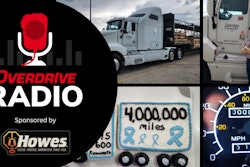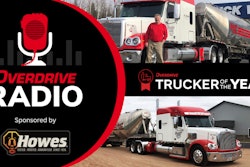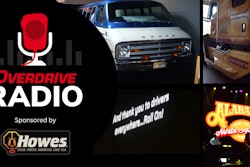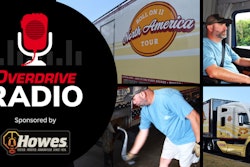"As anti-automated driving as I am, I might almost rather see some robots. At least they're not going to be looking at screens" going down the road.
--Owner-operator and Overdrive July 2024 Trucker of the Month Mike Nichols
We're picking up where we left off in Part 1 of this talk with owner-operator Mike Nichols, conducted by Overdrive News Editor Matt Cole and featuring Nichols' perspective on recent-history revenue and income. "I made more in '22 than I did in '23," NIchols said, calling the reality, mostly, a result of the revenue boost that came with skyrocketing fuel surcharges that unprecedented year.
Nichols, regular readers and Overdrive Radio listeners will know, runs leased to Wayne Transports with his 2020 Freightliner Coronado glider, pulling dry bulk. "We've got a good fuel surcharge," he said. "There isn't any Mickey Mouse games with detention," either, which couldn't be said in his days pulling a reefer around the turn of the century.
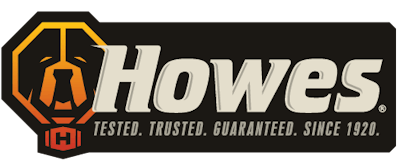 Here's a big thanks to continued support for Overdrive Radio from the fine folks at sponsoring company Howes, longtime provider of fuel treatments like its Howes Diesel Treat anti-gel and Lifeline rescue treatment to get you through the coldest temps, likewise its all-weather Diesel Defender and Howes Multipurpose penetrating oil, among other products.
Here's a big thanks to continued support for Overdrive Radio from the fine folks at sponsoring company Howes, longtime provider of fuel treatments like its Howes Diesel Treat anti-gel and Lifeline rescue treatment to get you through the coldest temps, likewise its all-weather Diesel Defender and Howes Multipurpose penetrating oil, among other products.

"I'm a firm believer in 'loud pipes save lives,'" as Nichols put it, "because people aren't paying attention." Nichols' is a voice for change on that score, in word as in deed.
His No. 1 recommendation for truckers and four-wheelers alike: "I can't underscore it" enough, he said, urging Overdrive to "print it in bold, highlighted, letters."
LEAVE 'ENOUGH SPACING' BETWEEN YOUR FRONT BUMPER AND THE VEHICLE IN FRONT OF YOU. RESPECT FOLLOWING DISTANCE.
Way too few truckers and nearly no passenger-vehicle drivers respect "following distance anymore," he said. "A huge percentage of people are driving within a second" of the vehicle in front of them, which can be disastrous when the worst happens. Take a listen:
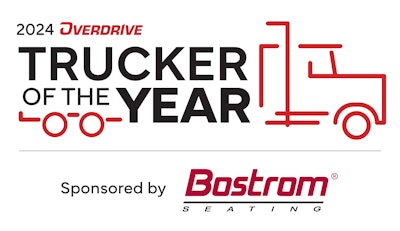 You can enter your own owner-operator business -- or that of another deserving owner -- in Overdrive's Trucker of the Year competition via this link. It's sponsored for 2024 by Bostrom Seating; the ultimate winner with receive a seat from the company up to a $2,500 value, likewise a custom replica of the tractor of their choice as trophy. Enter today!
You can enter your own owner-operator business -- or that of another deserving owner -- in Overdrive's Trucker of the Year competition via this link. It's sponsored for 2024 by Bostrom Seating; the ultimate winner with receive a seat from the company up to a $2,500 value, likewise a custom replica of the tractor of their choice as trophy. Enter today!
Also in the podcast: From the Large Cars & Guitars truck show in Tennessee this past May, a window on a stunning 2023 Peterbilt 389 in small fleet West Lawrence Logistics of Town Creek, Alabama, piloted by three-year company hauler Jarad Mullinix.
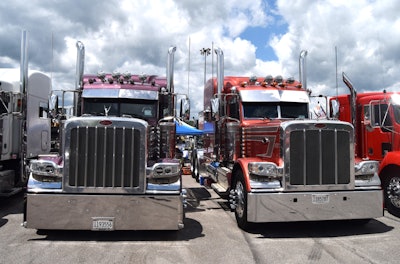 Meantime, here's a shot of the 2023 (left) parked up at Large Cars this past May, next to a 2019 389 in West Lawrence owner Myles Parker's father's Mam-Zak fleet, piloted by Lee Nurse. Both Jarad Mullinix and Nurse began their flatbedding careers in TMC's training program before finding homes with the father-son fleets out of Alabama.
Meantime, here's a shot of the 2023 (left) parked up at Large Cars this past May, next to a 2019 389 in West Lawrence owner Myles Parker's father's Mam-Zak fleet, piloted by Lee Nurse. Both Jarad Mullinix and Nurse began their flatbedding careers in TMC's training program before finding homes with the father-son fleets out of Alabama.
Keep tuned for more views of the 2023 in a video in our Custom Rigs series airing later in the week.
[Related: Trucker of the Month Mike Nichols steers business with reliable partnerships high in mind]
Mike Nichols: You know, as anti-automated driving as I am, I might almost rather see some robots. At least they're not going to be looking at screen.
Todd Dills: For those of you who tuned into the last Overdrive radio edition, you'll recognize that as the voice of Wisconsin-headquartered July trucker of the month Mike Nichols. Hauling today leased to Wayne Transports with a beautiful two tone 2020 Freightliner Coronado, stacks behind the cab in a nod to the cabovers of old, where he got his first taste of truck ownership back in the 1980s -- part of the story told in part one of our talk with him. Overdrive news editor Matt Cole you'll hear interjecting some of the questions throughout again this week in part two. That's right, we're picking up where we left off with part two, featuring Nichols’ perspective on recent history revenue, and income.
Mike Nichols: I actually made more money in 22 than I did in 23, but I think a lot of that is an artifact of the high fuel prices.
Todd Dills: Leased to Wayne Transports and hauling dry bulk freight for customers there, Nichols notes...
Mike Nichols: We've got a good fuel surcharge, and so, you know, you're covered on that. and the other thing I really like about Wayne is there isn't any Mickey Mouse games with detention. You spend more than an hour and a half or 2 hours at a particular customer. You're paid on the hour. I mean, if it's, if it's a delay that's on the customer's end, I mean, that's... Time is money, you know? And if you're sitting there, man, I could have only dreamed of that when I was pulling that reefer around. You know, down in Arkansas, they're bringing you out a pallet, one, like, one pallet an hour, you know, so you're, you're actually cold storage for them for 20 hours sitting in the Arkansas sun, you know, then they want you to haul it back up to Wisconsin for a buck 20 a mile, or whatever it was back then. You know, this was, like I said, 20 some years ago, but I imagine.
Todd Dills: That sounds familiar, no doubt, to some of you. After the break, we'll drop back in with further recollections of those days running reefer, moving through his approach to health insurance, retirement planning, and as he intimated, up top, perhaps the biggest challenge any owner operator contends with today, safety on highways where distraction has become a norm. It's not easy, to say the least.
Mike Nichols: I'm a firm believer in loud pipes save lives, because people aren't paying attention.
Todd Dills: Before the very end, too. A window on a stunning 2023 389 in the small fleet of West Lawrence Logistics in Town Creek, Alabama, piloted by three year company hauler Jarad Mullinix. So keep tuned.
Speaker 3: Every season is diesel season, so power up yours with Howes. Poor quality fuel can wreak havoc on your engine even in the warmer months. Protect your diesel with Howes diesel additives and lubricants. 100% alcohol free and made with the highest quality ingredients, Howes products will keep your diesel vehicles and equipment running strong all year long. Visit Howesproducts.com to find out which product you need today to keep your engine running like new tomorrow. Howes tested, trusted, guaranteed.
Todd Dills: Find more information about all of house fuel treatments and more at HOWES, howesproducts.com. Here's owner operator Mike Nichols, looking back on those reefer days to bring us on up to the present, pulling dry bulk lease to Wayne Transports.
Mike Nichols: Oftentimes, what I would wind up doing when I was in the reefer is I'd go out loaded with a good rate, and I'd get frustrated at the rates they're trying to give me. Come back. I'm like, well, you know, what is a back haul anyways? I mean, isn't my backhaul somebody else's front hall? So, I mean, basically, you just get a discount because I'm away from home, and you think you can get, you know, get away with it, and I'd get frustrated and just come back empty. And so I kept my pride, but I blew the rate. You know, the outbound rate then was halved and, just didn't work. But, you know, ultimately, like I said, I wound up selling the reefer, and, it, was a factory buyback on the. On the truck.
Todd Dills: So, if you missed last week's episode, owner Nichols told the story there of the factory buyback, courtesy of Wisconsin's unique lemon law. Unique in that it applies not only to light duty vehicles, but also commercial trucks. The experience soured him on truck ownership for quite a time, as he notes in what follows, that truck he had christened the Lesa Marie, after his wife, who'd passed in a car crash that also injured Nichols in the early days of his marriage and trucking career. Story also told in part one of this podcast.
Mike Nichols: And then it was, you know, from that point till the Lesa Marie II was a good, oh, 15 years or so, that I was, you know, just doing other stuff, company driver, etcetera. And so I kind of ran the gamut. I pretty much pulled dry van, you know, pneumatic bulk liquid tank dump, m dump, reefer and livestock. And a couple of times, I actually had to rent a flatbed, pick up some railroad ties and some nursery stock. That was when I first was getting started in the business, and I did it enough to know I didn't want to pull a flatbed. I envy those guys a lot, but, I just, It's not for me.
Todd Dills: It's been a central theme in our coverage of July Trucker of the month Nichols career. The virtue in knowing your own limitations.
Mike Nichols: You see them on the side of the road or you see where your load shifted, you know, a load of pipe or something. And I'm just like, oh, man, I would not want to be that guy.
Todd Dills: As noted, he's found a home in dry bulk leased to Wayne transports, his primary partner for freight and more six years running.
Mike Nichols: I'm, glad. I'm glad I do what I do. it's a good gig. I mean, you got to. It takes a little bit of knack to figure out best ways to unload and different products unload at different pressures and speeds and things like that. But once you're doing it for a while, it's really a breeze, you know? Yeah. Only issue I don't like, I will say, is, I'm not a big fan of heights as far as ladders and climbing on stuff. And once in a while, you got to get up on the trailer. We got fall protection, but, it doesn't matter. I'm still. I don't like it. In fact, I can't even watch other people up on the trailer. I have to look away because, you know, you got guys that'll just, like, you know, they're basically dancing across the top of that thing. And I. No, I, I wanted to keep my center, my center of gravity low, so bought a good set of knee pads, and I just climb across the top. Only real drawback that I. That I feel like, you know, that I have with it. But, you know, everything's got its pluses, and negatives or whatever, and that's a pretty small negative considering all the. All the. All the pluses.
Matt Cole: Looking back at 2023 overall, you know, how do you feel like business went for you?
Mike Nichols: I made about 60 or 70,000 less than 2022, but as I said, I think that was part of the fuel surcharges. I was off a couple of weeks towards the end of 2023, so that definitely hit the bottom line a little bit, but no, we made money. I do my own day to day bookkeeping, expense tracking and things like that. But I have, a CPA that actually does the tax preparation. Payroll, tax. Workman's comp or not workman's comp. Unemployment, contribution for your, unemployment insurance. So it's all. We're all on the books with. Everything works out real well doing it that way. Pretty reasonable fee that I pay them each month. And, they take care of all that book work. They are not trucking specific. I do believe he has several clients that are, independent contractors, owner operators. But he knows the business, let's put it that way, from the. From the tax end. And he is, like I say, he is a CPA. So, yeah, that helps out. And Wayne takes care of all your, mileage reporting and all that stuff that's part of your, that's part of your lease. So I don't have to worry about that.
Matt Cole: So looking at '24 so far. How's it going compared to last year?
Mike Nichols: A little slower. not because of freight being slow. I just. I had a. I had a deer strike in March, so I was down from that. I was out sick for a little while in January and then, ruptured a blood vessel in my knee and was off for about two weeks from that. So just personal rise, you know, I've had, some hiccups or whatever this year, but staying busy since, busy as I want to be, that's for sure. Still kind of playing catch up, you know, from being off a little bit. But, we're getting her there. This is more miles, more money. And so that's what matters.
Matt Cole: How many miles have you run this year so far?
Mike Nichols: Ballpark? 60, maybe 50,000. I'm not a big mileage intensive, kind of guy. I mean, I always get a kick out of seeing, being the backs of trailers. This is more miles, more money. Like, I don't necessarily want to work more miles. You know, I generally run, you know, on a full week, I'll generally run two to 25. But they're profitable miles. And so that's what matters.
Matt Cole: You know, you've kind of gone out on your own to get health, insurance. What, What have you found that works for you there?
Mike Nichols: You know, unfortunately, the affordable care act, that was passed, kind of ruined the private health insurance market. If you're buying health insurance on your own, you're pretty much looking at going into the, marketplace, as they say, you know. So it's, you get basically a choice of health plans that are, that are eligible, you can choose, and then there's a subsidy that's available if you don't have enough income to cover all of that. I, do pay something every month, but, it's not too bad. I mean, I'd like to have something different and I'm hoping that sooner, or later I can make a switch. And I mean, I'm not really super happy with it, you know, you. Health insurance, you know, the deductibles and the co payments are such now that, a lot of times you'd be better off going into one of those cost sharing plans. You know, like a, medical, benefit sharing, you know, deal where it's not really insurance. Everybody just kind of. It's like a pool. Right? Right. Yeah. And I've kind of been thinking about looking into that also. well, Wayne had some insurance options through true north, and OOIDA has, some different insurance options that I've been, considering looking at big time. I'm huge into OOIDA. I love OOIDA. What a great organization, association.
Matt Cole: Have you ever been on the board or anything for OOIDA? Or are you just active member?
Mike Nichols: Interesting that you ask. they accepted my nomination this year. The nominating committee approved my nomination and they invited me to come down to their fall meeting. So I will, go down there, I'll do a little interview that's on their, their landline now podcast. If, the membership, the voting membership likes what they hear, hopefully they'll vote for me. But. Yeah, kind of excited to do that, for sure. And, you know, I do a lot of, I do a lot of media outreach because I think that's something. Again, I'm not, you know, I'm not an ace mechanic or anything like that, so that's not really my forte in the trucking business. But definitely, you know, media exposure, outreach, writing op ed pieces, those things I certainly can do and have done. Trucking has been under attack for as long as I can remember. As far as, as far as, regulatory environment goes, you know, definitely the emissions challenges that, they've been ramping up every year really motivate me to speak out against that. That's a big motivator. Back in 2005, they came out, I think it was right around 2005, they came out with a ultra low sulfur diesel. And I distinctly remember telling a couple people, I'm like, you realize they're not going to be happy with this. I mean, that's not going to, you know, and sure enough, you know, what is it about every three years, they want something new? They want, you know, more restrictions. Where does it go? You know, I just. I can't make a case for an electric vehicle. Cost twice as much, does half the work, and last half as long. I just don't know how anybody can make a business case for that. And then, not only that, but the power generation challenges a company, a company out of Joliet, Illinois, that was going to electrify his whole fleet. And the city utility said, you're going to use as much power as the rest of the town. You can't do it. It's just completely not workable, especially for what I do, you know? How would you ever do that? I don't know. Maybe someday it will be, you know, the market will choose whatever makes the most sense. You know, government never seems to get that. They have to mandate everything. If you have to mandate it, it's probably not good for you in some other, you know, that's why they mandate it, because they know nobody else would do it of their own volition.
Todd Dills: Regular listeners will recall Nichols truck as a freightliner Coronado glider with a Detroit factory Reman engine pre emissions. He's certainly a testament to that. And notes he'll probably keep that truck as long as he can. Owner operator Nichols has plenty of road ahead of him. But the subject then did turn to retirement, and how the owner approaches, preparing for it. Mike Nichols: I have some modest, retirement plans, savings. I honestly don't, you know, I'd really like to see myself driving as long as I pretty much can. Assuming, assuming everything else stays the same, assuming there's still human drivers and trucks, I guess, at that point. But, I, you know, I just, I feel like I want to drive, you know, do what I'm doing until they throw dirt on one of us. I don't really see myself just hanging up the keys and sitting at the house. Maybe that's ultimately what will happen. You know, medically, I can't drive or something, but so far, no problems. So I'm, I feel good. I am 56, so I definitely like to see myself driving another ten to 15 years, for sure, at least. I mean, we've got guys, you know, I've seen guys on the road that are, you know, late seventies that are still running, you know, you don't have to run it, you know, it doesn't mean you have to work as hard. You don't have to be hair on fire. You know, six days a week or whatever. you know, but if you're. May as well stay busy. And, I think that's a great way to do it, you know. And again, I'd like to, I like to do my advocacy stuff as much as I can. You know, time is always just, you know, do I have the time to do it? But usually what will happen is I'll read something, you know, in some news site or whatever that'll just kick me off, and then I'll, I'll start firing off letters to the editor or op eds or whatever. You know, most of the time they don't get printed, but, you know, every once in a while, for sure. Yeah. And I've made some media contacts, so Oida has given me a bunch of media leads. You know, if they want, you know, a media wants a trucker to comment on something that recently just happened. I still work with them quite a bit as far as, connecting with members of the media. I think I did four interviews in one week, just like a month or two ago. Fox and New York Times, Washington Post.
Todd Dills: And that includes some measure of intra trucking advocacy as well, particularly with respect to so called safety technology, the bedrock's necessity of effective training and more.
Mike Nichols: There's no substitute for an experienced driver with good judgment. And they just, honestly, a lot of them don't seem to care. You know, they think they can augment, a low skilled driver with technology. And I'm always like, you know, why won't they spend the same amount of investment in, you know, not only compensation, but in training in the government? You know, the training standards that they have are nowhere near enough. And even at that, these companies are constantly applying for waivers and things like that. That's in the register, you know, like, well, we want the trainer to be able to sleep well, wait, if he's in the bunk, how is he training? You know, that's crazy. You just, what you want is you want a team driver. You want team drivers and you want one of them to not make as much. That's, that's what you want. And unfortunately, they seem to be getting it. FMCSA seems to be, approving their, their request for, exemptions.
Matt Cole: Yeah. At least in the cases where the driver or where the trainee has passed their, cdl skills test, which then, I mean, you know, that's as green as you can get as a, as a driver.
Mike Nichols: Exactly. You bet. You bet. And I, you know, I guess maybe these big, big, you know, mega outfits are self insured, so, you know, otherwise, I was just going to say, you know, I can't imagine the insurance company would be on board with that, but I suppose most of them insure themselves.
Matt Cole: So for any, up and coming or, you know, aspiring owner operators, what advice would you give?
Mike Nichols: Be careful on the terms. shop around for the terms. So if you're, you know, don't take the first offer. Oftentimes, if you've got decent credit, you can, you can find a better rate, you know, than going through the dealership where you're financing it. I mean, they're making money on that rate just like they are making money on selling you the truck. You know, they'll get the rate at, you know, say, 6% and try to sell you at eight, you know, or whatever. I saved myself almost, I think, two and a half percentage points shopping around and going through a private bank, on the financing as opposed to what the dealer was offering me. And interest rates now are, you know, I don't know that I could do it or would do it, I should say. You know, I pay five and a half percent on my. On my note. So it's. The hard parts passed. I'm, about three quarters of the way paying for it, maybe, maybe two thirds, you know, watch, you know, have some reserve cash on hand so you can cover an emergency, you know, and don't short on your maintenance, you know, because that's. If you take care of the truck, it will take care of you. I know. Every time I'm, at a dealership or even, you know, even over at our local shop here at junior junior truck repair and fabrication, it seems like they're working on one or two trucks with emissions problems. You know, that's almost always what it is. I just can't imagine taking on all that extra. All that extra burden. I mean, you have to. You have to. But of course, they like to say they've gotten better, but they're expensive and, you know, there's maintenance and, you know, additional weight.
Todd Dills: Of course, Nichols is well over 2 million mileS into a safe career. No DOT-recordable crashes over all the miles. A fender bender early on in his career in a snowstorm, though, proved instructive in some ways.
Mike Nichols: It was probably preventable. And that was in 91, in a snowstorm in Illinois. Coming up, I 39. I was about 10 miles from the house. You know, they always say accidents happen close to home, but I was in a. My regular truck had broke down. So I didn't have a radio, CB, and it was a blinding snowstorm. Something that I, you know, now I would never even dream of driving in, right. But, you know, I was maybe young and a little. Little more naive back then and was trying to get home, you know, to get home itis. And, I was probably only doing, like, 10 miles an hour, but traffic was stopped in front of me, the road was icy. And, the latter, I was pulling a delivery van or, a dry van, like a 40, 45 foot dry van with a curbside door that had a ladder on it. And that ladder caught the quarter panel of an oldsmobile that was stopped in traffic. But nobody was hurt. Damage was pretty minimal, you know, maybe a couple thousand bucks or something at the time. And that's it. As far as, as far as accidents go.
Matt Cole: Well, what do you think it takes in today's world with all the distractions of, you know, four wheel drivers and all that kind of thing to, you know, to remain a safe driver?
Mike Nichols: I can't underscore it or print it in bold, highlighted, letters. Enough spacing. Following distance. Nobody respects following distance anymore. Trucks and cars. I shouldn't say nobody. I mean, don't speak in absolutes, but a huge percentage of people are driving within a second. And I never. I never. I always wonder, like, how these big companies do that, because I always thought that they had this adaptive cruise or whatever that would slow the truck down if they get too close or whatever. But you see them, and they're less than. They're like a truck length or less apart. And I don't know how you can go down the road like that. I mean, my anxiety wouldn't allow me to do that. I don't want to be a participant in an accident. I would much rather be a witness. You know, I want to. I'll watch from here. Back here, guys, you have at it. But when you're in a big group of people like that, you're essentially tendering control of your. Of your vehicle to that other guy. You're only going to be as good as the weakest driver when you're in a herd. And so I want clean air. That's my secret. I'm always looking for clean air, whether it means I got to slow down or speed up. I'm trying to stay away from the pack. Harder and harder to do. Nowadays, infrastructure is in, a woeful state as far as I'm concerned. You know, there's too much traffic. You know, roads that are four lane highways really need to be fixed. You know, I'm on, you know, places like Interstate 40 that there's just too much traffic. You're out in the middle of the middle of Arkansas and Interstate 40, and it's just, you know, bumper to bumper traffic all the way across and it's all going 60, 70 miles an hour until there's some sort of incident and then it stops. Right. But yeah, people drive too fast and they drive too close. And of course, the distractions, like the screens, everybody is pinching and swiping and scrolling all the time. And that infuriates me. I mean, I'm watching people that are merging and they can't even wait to get going in traffic. They're actually on their phone, staring at their screen as they're merging. And I'm like, what are the odds that that person is paying attention to me? I can't move over. There's somebody on the left side of me, you know, so I'm a firm believer in loud pipes. Save lives, because people aren't paying attention. And, you know, if I need to bark the jake at you or something to make you look up, then that's what I'll do. It is unbelievable how distracted, people are. And unfortunately, I see it in trucks now too, an awful lot. And I don't know what, I don't know, I don't know a good way to fix it. People are addicted to their screens. The guy's got his foot on the dash and he's watching YouTube or something. And I'm like, this is unbelievable. You know, honestly at that, you know, as anti automated, driving as I am, I might almost rather see some robots. At least they're not going to be looking at screens. It's the distractions are just huge. And I think that's the biggest killer out there. And that following distance. Yeah, I can't overstate that. one thing I do like, that normally I probably would not be a big advocate of is Wayne incorporated the Netradyne system, I think you probably are familiar with that. it's a camera only looks forward. Ours don't look backwards, although I guess it can, but then it, you know, it's rating you every day as far as how you're driving, following distance, speed, unsafe turns, you know, if you're pulling extra, extra G's, you know, that lateral G's or something going around a roundabout, you know, it's looking at all that stuff. And I like having an objective metric. I mean, I know how I'm driving because I've been doing it long enough, but it's nice to be, reaffirmed, if you will, by that. And so I like that. I think that's been a good, a good investment. And I think, I think they're pretty happy with it as well. we've only been using it now for about a year, I think. But, I think it works out real well.
Matt Cole: Is it a requirement that all their independent contractors put them in the trucks?
Mike Nichols: Yep. all, every truck, I think, has them now. I think it's wise, I think it's a good investment. And I, you know, the cameras, of course. You know, I like the, I like a forward looking camera. So it is, you know, hopefully going to protect me in case of, you know, the accident or a frivolous lawsuit or something. I actually have my own camera on my gps, and then I have two cameras looking backwards. Okay. From diesel, boss. because I always think, you know, the way people drive, you know, they're always driving too fast for conditions and, somebody gets loose and they bump into me in the back. Who's to say that? They don't say, well, he came into my lane. I want that on, I want that on record. So I think that was a good investment. Oh. Another huge safety feature I love is I have the road watch, road surface temperature sensor. You know, it's infrared. And so when you're, you know, you drive, you know, typically, like you'd be driving in a cold November day or something, or maybe it's raining out, but on the verge of freezing. It's nice to have that, to have that confirmation that it's not freezing yet. You're not just looking for tire spray and stuff like that. And it's super sensitive. You can actually, like when you're going across a bridge, you'll see how it'll, you know, to drop a few degrees and then right away go back up. Or if you're going through like, you know, in the shades, shadows of trees or whatever, you'll, see the temperature change like instantly. So, yeah, that's, that's a big help. I recommend those a lot. And, you know, and again, something else too, is, you know, I'm pretty risk averse. I don't want claims, I don't want damages, I don't want accidents. So if I, you know, my risk benefit calculation has gotten way more conservative as I've gotten older and more experienced and, you know, you see these guys in the ditch, you know, even if there's nobody else involved, and even if they keep the shiny side up, that's still like a $10,000 deal to get pulled out of there, you know, I don't risk it. you know, if you're empty or something, then I get even way more conservative. So I'd much rather wait it out somewhere than, take a chance, especially if you don't have to, you know, I mean, you know, somebody's somebody. Somebody's out of product or something, you know, then that risk benefit calculation changes a little bit. But, you know, if it's something that, if it's, you know, if it's late, you know, because of the weather, then it's late. And being communicative with the customers is always huge. So I'm the first person to say, hey, you know, this might be a little late or might be running into this. And, you know, most things can be worked out before they become, you know, problems.
Todd Dills: Here's wishing him luck in our Trucker of the year competition for 2024. We've got a few more monthly honorees coming your way through October, and then it's on to three finalists. The winner, the new year. You can put your own business in the running @ overdriveonline.com/toptrucker. The program is sponsored by Commercial Vehicle Group and Bostrom Seating. Owners of up to three trucks are eligible to compete. Prizes include a Bostrom seat as well as a custom replica of the tractor, the owner's choice. Again, you can find the nomination and entry form at overdriveonline.com/toptrucker.
Finally, for this Overdrive Radio edition, a bit of a window on one among the last of the 389s with a 2023 model Peterbilt and its driver, one Jarad Mullinix, now hauling for Myles Parker's West Lawrence Logistics small fleet of Town Creek, Alabama. The rig was parked up at the large cars and guitars truck show this past May next to a slightly older 389 driven by Lee Nurse in the fleet of Myles Parker's father, Mack, called Mam-Zak. Mullinix ran us through his purple effect paintwork, striping and more mods done to the rig, including a chrome surround on the digital dash, along the way detailing what drove the former Florida police officer to take up trucking just a few years ago, finding a home with the West Lawrence small fleet after a time flatbedding with TMC.
Jarad Mullinix: Truck, my handle, or whatever, my tiktok name is the Rowdy Rooster. And so, going with the chicken theme, I call it Fowl Attitude. Name is Jarad Mullinix. I work for West Lawrence Logistics, out of town Creek, Alabama. Truck is owned by Myles Parker. It's a 2023 Peterbilt 389, Cummins 565 18 speed 3.70 rear ends, 24.5 tires. So we mainly do 90% conestoga, 10% flatbed. Mostly, aluminum and steel.
Todd Dills: Where's Town Creek?
Jarad Mullinix: So it's about 30 minutes west of Decatur out there towards the muscle Shoals tuscumbia area. I live in Florida. He bought it, December of 2022. Had 167 miles on it. I went straight into it and it now got 170 in. You got the watermelons underglow, Bumper lights. Most of the accessories are either from rockwood, roadworks or horse and buggy accessories. We're waiting on a T-bar from twelve gauge customs, being custom built for the fenders and stuff. But we're also having our logo cut in the middle and backlit. Takes a little bit to get that in. But chrome country, Ben at Chrome country has been working with us with that. It's right there at the Rust Truck Center in Smyrna, Tennessee. A lot of, you know, a lot of places we haul for like the look of the trucks. They would ask for us over the other competition. It's called purple effect, but it's a custom purple effect because they added more flake to it. Russ Peterbilt up there at Smyrna, they did the custom stripe on it. All the trucks have, you know, different colors, different stripes, but they're all 389s or three hundred and seventy nine s. I was a police officer and deputy sheriff for approximately ten years. Got tired of the politics. Got tired of living in a glass house. I like to throw rocks. So that didn't mesh well with the industry. My father was a truck driver. My uncle, my grandfather's brother, he owned his own logging company out of Mississippi. Ever since I was little, I was always a missed, you know, helping him, doing stuff. So when I got tired of being a police officer, I was like, I'm gonna go do it. So here I am.
Todd Dills: Anything else on the interior?
Jarad Mullinix: I'm still working on the interior. It's a ... Myles lets me do whatever I want, so I do it within reason, you know, at a time, not all at once. It's like I said, it is a working truck. So if it's down, if it ain't moving away, making money. So I like to make money. He likes to make money. He also likes to have nice things.
Todd Dills: So how long, how long you've been driving? Total?
Jarad Mullinix: Total, three years. Did ten months with TMC. And, my goal, obviously everybody's goal is to own their own, you know, the big hood truck. And, ten months into it, I was like, I'm tired of the big company. So my buddy worked for another small company up there in Tuscumbia. He said, hey, look at Mam Zak. So put an application. Matt called me and said, hey, you only got ten months, but you can go work for my son. And I was like, I'll be there. So literally, two weeks later, driving for Myles.
Todd Dills: The Fowl Attitude 2023 389 and the 2019 389 parked next to it caught my eye for the color combinations, mostly, at first. Keep tuned for more views of the rig Mullinix detailed there in a video in our custom rigs series late next week. Again, owner operators can enter Overdrive’s Trucker of the Year competition via, overdriveonline.com/toptrucker. Get your nomination in before we get to October for consideration in this year's round. You can find a direct link to that page in the show notes. Wherever you're listening, Overdrive Radio is on Spotify and Soundcloud, Apple Podcast and YouTube, Overdrive's Facebook page and any listening platform. Really big thanks to you for listening.

